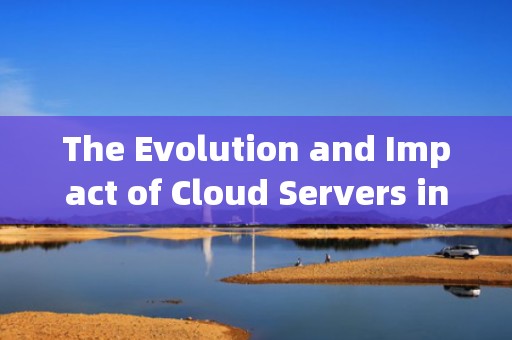In the rapidly evolving world of information technology, cloud computing has emerged as a transformative force, reshaping how businesses operate, how data is managed, and how services are delivered. At the heart of this revolution lie cloud servers, which have become indispensable tools for organizations of all sizes. This article delves into the evolution, benefits, challenges, and future prospects of cloud servers in English-speaking markets.

The Genesis of Cloud Servers
Before delving into the specifics of cloud servers, it's essential to understand what they are. A cloud server is a virtual server that runs on physical hardware hosted in a data center. Unlike traditional physical servers, which require significant capital investment and dedicated space, cloud servers offer scalability, flexibility, and cost-efficiency by leveraging virtualization technologies.
The concept of cloud computing can be traced back to the 1960s when John McCarthy envisioned "computational utilities" provided via networks. However, it wasn't until the late 2000s that cloud computing began to gain mainstream traction, thanks to advancements in internet technologies and the emergence of key players like Amazon Web Services (AWS), Microsoft Azure, and Google Cloud Platform (GCP).
Advantages of Cloud Servers
Scalability and Flexibility
One of the most significant advantages of cloud servers is their unmatched scalability and flexibility. Businesses can easily adjust their computing resources based on demand, without the need for upfront investments in hardware. This on-demand model ensures that companies only pay for what they use, leading to more efficient resource allocation and cost savings.
Cost Efficiency
Cloud servers eliminate many of the capital expenses associated with traditional IT infrastructure, such as purchasing hardware, maintaining data centers, and hiring specialized staff. Instead, businesses can opt for operational expenses, paying for services as needed. This shift not only reduces costs but also allows for better budget forecasting and cash flow management.
Disaster Recovery and Backup
Cloud providers typically offer robust disaster recovery solutions as part of their service packages. These solutions enable quick data restoration and minimize downtime, ensuring business continuity even in the face of unforeseen events. Moreover, regular backups are often automated, reducing the risk of human error.
Accessibility and Collaboration
Cloud servers enable remote access to applications and data from virtually anywhere with an internet connection. This feature is particularly beneficial for distributed teams, freelancers, or businesses with multiple locations. Additionally, cloud platforms often come with built-in collaboration tools, enhancing productivity and facilitating seamless communication among team members.
Challenges and Considerations
Security Concerns
While cloud servers offer numerous benefits, they also present certain security challenges. Storing sensitive data off-premises raises concerns about data breaches, unauthorized access, and compliance with industry regulations. Therefore, selecting a reputable cloud provider with strong security measures and conducting regular audits is crucial.
Vendor Lock-In
Another potential drawback is vendor lock-in, where businesses become overly dependent on a single cloud service provider. Migrating data and applications between providers can be complex and costly, limiting flexibility and potentially resulting in higher long-term expenses. To mitigate this risk, organizations should consider adopting multi-cloud strategies or using open-source technologies that promote interoperability.
Performance and Reliability
Although cloud providers strive to offer high availability and reliability, occasional outages can still occur due to factors like natural disasters, cyberattacks, or system failures. It's important for businesses to have contingency plans in place and to choose providers with a proven track record of uptime and excellent customer support.
Future Trends in Cloud Computing
Edge Computing
As the Internet of Things (IoT) continues to grow, edge computing is becoming increasingly relevant. By processing data closer to its source rather than relying solely on centralized cloud servers, edge computing reduces latency and bandwidth usage, enabling faster decision-making and real-time analytics.
Artificial Intelligence and Machine Learning
AI and ML are poised to revolutionize cloud computing by automating routine tasks, enhancing security through advanced threat detection, and providing deep insights from vast amounts of data. Cloud providers are investing heavily in these technologies, offering pre-built models and tools that make it easier for businesses to incorporate AI and ML into their operations.
Serverless Architectures
Serverless computing, also known as Functions as a Service (FaaS), is gaining popularity for its ability to execute code without the need to manage underlying infrastructure. This approach further abstracts away the complexity of server management, allowing developers to focus on writing code while the cloud provider handles scaling, provisioning, and maintenance.
Sustainability Initiatives
As environmental awareness grows, so does the pressure on tech companies to reduce their carbon footprint. Many cloud providers are committed to achieving net-zero emissions by investing in renewable energy sources, optimizing data center efficiency, and promoting sustainable practices among their customers.
Conclusion
Cloud servers have undoubtedly transformed the landscape of IT, offering unparalleled advantages in terms of scalability, cost efficiency, accessibility, and collaboration. While challenges such as security concerns and vendor lock-in exist, careful planning and strategic partnerships can help mitigate these risks. As we look towards the future, emerging trends like edge computing, AI/ML integration, serverless architectures, and sustainability initiatives promise to further enhance the capabilities of cloud servers, making them an integral part of any modern digital strategy.
随着互联网的普及和信息技术的飞速发展台湾vps云服务器邮件,电子邮件已经成为企业和个人日常沟通的重要工具。然而,传统的邮件服务在安全性、稳定性和可扩展性方面存在一定的局限性。为台湾vps云服务器邮件了满足用户对高效、安全、稳定的邮件服务的需求,台湾VPS云服务器邮件服务应运而生。本文将对台湾VPS云服务器邮件服务进行详细介绍,分析其优势和应用案例,并为用户提供如何选择合适的台湾VPS云服务器邮件服务的参考建议。

工作时间:8:00-18:00
电子邮件
1968656499@qq.com
扫码二维码
获取最新动态
